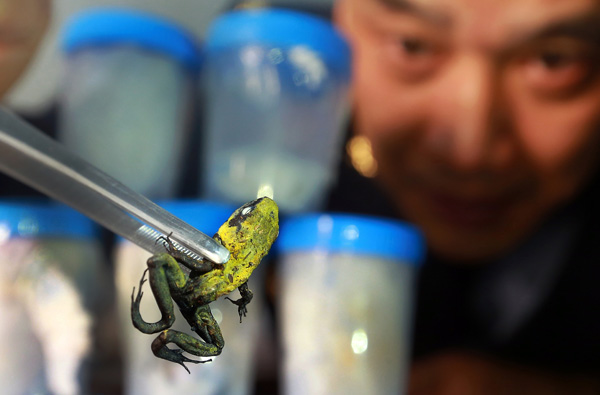 |
|
The carcass of a poison dart frog that was intercepted by the Beijing border inspection authorities represents one of a number of dangerous species. [Photo by Zou Hong/China Daily] |
Inspection and quarantine officers in Beijing intercepted 10 deadly frogs on Friday in a shipment that was supposed to contain clothing, the Beijing Entry-Exit Inspection and Quarantine Bureau said on Monday.
The 10 poison dart frogs, among the most dangerous species in the world, was the largest haul of the species ever intercepted by authorities in China, said Zhang Jijun, director of the mail department of the bureau.
The frogs were spotted when officers used an X-ray machine to inspect international parcels, according to a statement from the bureau.
The X-rays showed the parcel that was posted in Poland contained 10 plastic bottles but was marked "clothes and gifts", which aroused suspicion, the statement said.
When officers unpacked the parcel, they found the bottles contained the frogs. The bottles had been wrapped in clothing and newspapers in an apparent attempt to disguise them, the statement said.
The frogs, which are native to South America, will be sent to scientific institutions for research purposes, Zhang said.
The person to whom the parcel was sent, a Beijing resident, has been blacklisted by the bureau, which means international parcels and mail sent to the address will be carefully inspected in the future, he said.
The officers suspect the person to whom the parcel was sent planned to raise the frogs as exotic pets, Zhang added.
Meng Chen, an officer at Zhang's department, said, "It is becoming more common for people to buy exotic animals from European countries, where trade in unusual pets is thriving."
Meng said the bureau now routinely uses X-ray machines to scan almost all mail and parcels sent to China from overseas.
Zhang added that the bureau has intercepted a large number of foreign species, including scorpions, turtles and bugs, in recent years.
"Such species could cause serious harm to China's ecology, environment and agricultural production and even human health," he said.
"They are forbidden to be brought or sent to China, and we advise people not to buy species from overseas through online shops."
More than 1,030 batches of plants and animals and their products, including seafood and herbs, were intercepted by the bureau in the first quarter of this year, an increase of 79 percent over the same period last year, Zhang said.
All of the illegal goods that are intercepted are either properly disposed or, if there is no risk, sent back to their senders, he said.
The types of invasive species mailed from overseas differ by season, he added.
"For example, aquatic products are most often mailed during the winter, while seeds and seedlings are mostly mailed during the spring," he said. "As the weather becomes warmer, the mailing of live animals becomes more common."
Last year, inspection and quarantine authorities intercepted 1.04 million batches of harmful species at Chinese ports and prevented them from entering the country, an increase of nearly 30 percent over 2014, according to the General Administration of Quality Supervision, Inspection and Quarantine.
